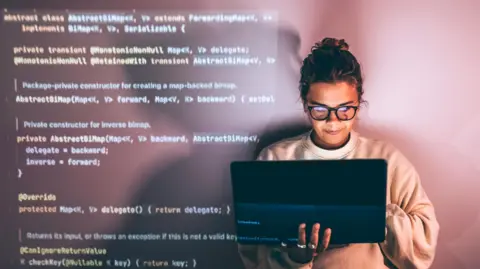‘Vibe coding’ named word of the year by Collins Dictionary
8 minutes agoLaura CressTechnology reporter

 Getty Images
Getty ImagesIf you’ve ever wanted to create your own computer program but never learnt how to code, you might try “vibe coding”.
Collins Dictionary’s word of the year – which is confusingly made up of two words – is the art of making an app or website by describing it to artificial intelligence (AI) rather than by writing programming code manually.
The term was coined in February by OpenAI co-founder Andrej Karpathy, who came up with the name to represent how AI can let some programmers “forget that the code even exists” and “give in to the vibes” while making a computer program.
It was one of 10 words on a shortlist to reflect the mood, language and preoccupations of 2025.
By giving an AI tool a simple description such as “make me a program that schedules my weekly meals”, people can use “vibe coding” to make basic apps without any previous programming knowledge.
More complicated tools still require skill, but the practice has opened up creating digital platforms to non-coders.
As many have discovered, it isn’t perfect – with no guarantee the code will actually work or be free of bugs.
Alex Beecroft, the Managing Director of Collins, said the term “perfectly captures how language is evolving alongside technology”.
‘Clankers’ and ‘broligarchy’
Not all the words necessarily first emerged in 2025 – but Collins decided this was the year they became popular.
For example “clanker”, a term used to describe robots in Star Wars games and movies since the mid 2000s, made the list after it went viral on TikTok in July as people shared their frustrations with AI-powered machines.
While “aura farming” – people doing things for the sake of looking cool, often when they know they’re being filmed – was first used in January 2024, but became increasingly popular over the course of 2025.
And the portmanteau “broligarchy” took off in 2024 to describe the owners of the world’s biggest technology companies and their purported political influence – and was used frequently in 2025 following the appearance of many of the bosses at US President Donald Trump’s inauguration.
The other definitions in the shortlist were:
- Biohacking, the activity of altering the natural processes of one’s body in an attempt to improve one’s health and longevity
- Coolcation, a holiday in a place with a cool climate
- Glaze,
- Henry, acronym for “high earner, not rich yet”, or a person who has not accrued substantial wealth from their high income
- Micro-retirement,
- Taskmasking, the act of giving a false impression that one is being productive in the workplace


Sign up for our Tech Decoded newsletter to follow the world’s top tech stories and trends. Outside the UK? Sign up here.